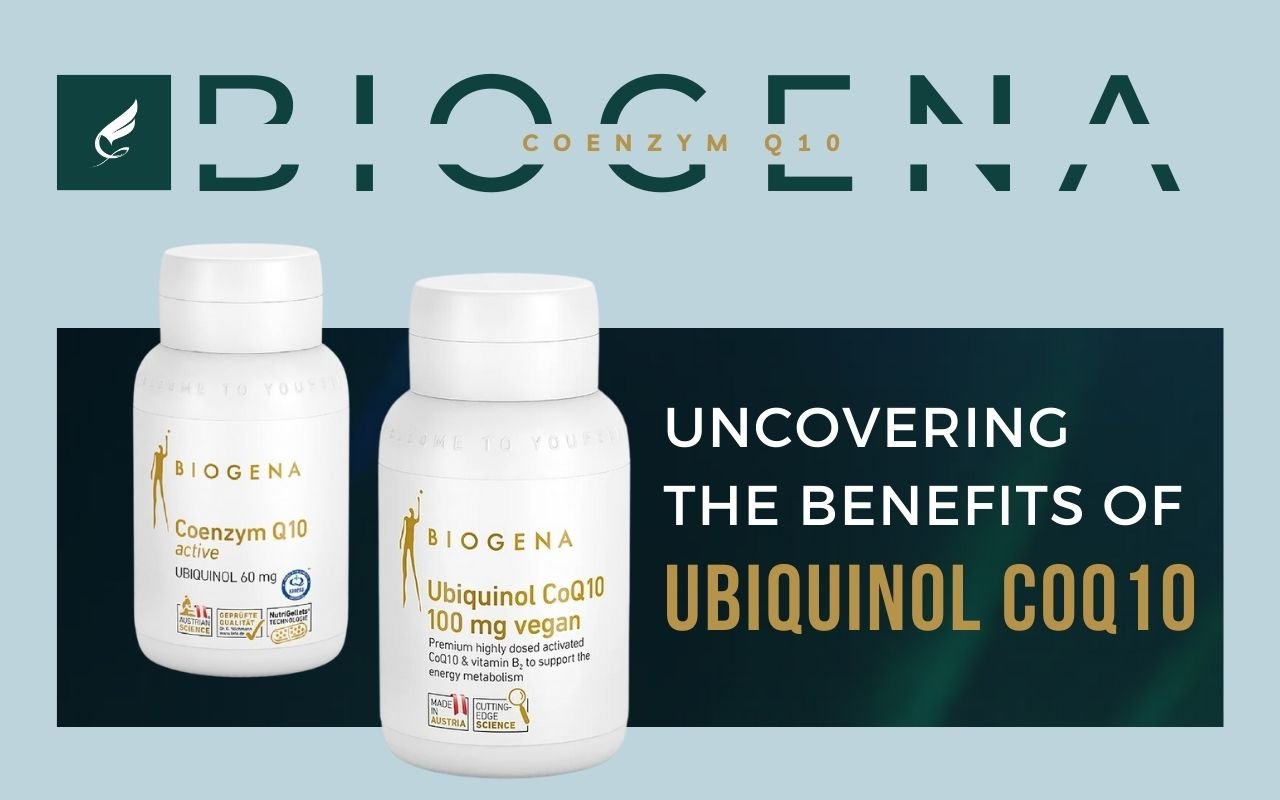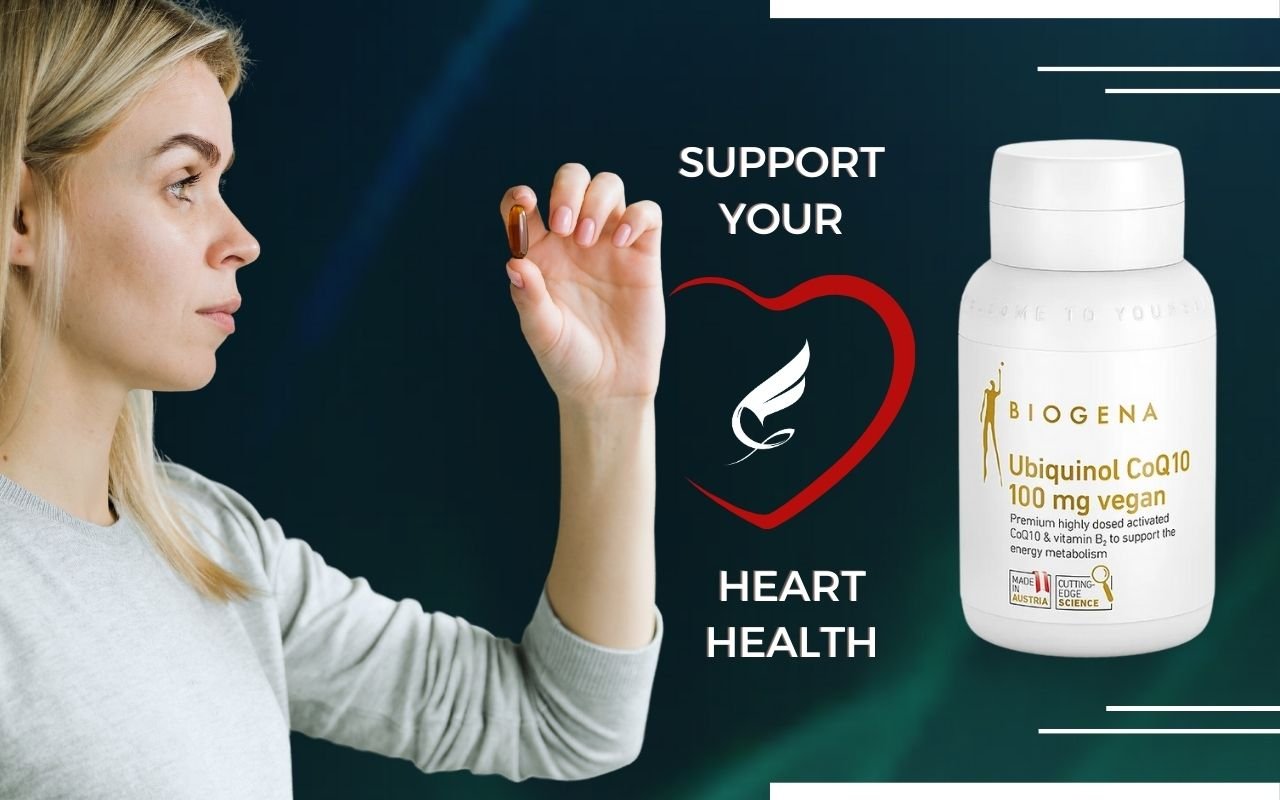Uncovering the Benefits of Ubiquinol CoQ10
Ubiquinol CoQ10, an essential nutrient often overlooked, may hold the key to unlocking numerous health benefits. It plays a crucial role in producing cellular energy and offering antioxidant protection, which can significantly impact overall well-being. In this blog post, we will delve into the science of ubiquinol CoQ10, its various health advantages, and the importance of choosing the right supplement. By the end, you will be well-equipped with the knowledge needed to make informed decisions about this powerful nutrient.
Key Takeaways
Ubiquinol CoQ10 is the active form of coenzyme Q10 which supports heart health, regulates blood sugar levels and provides antioxidant benefits.
Clinical studies have demonstrated its efficacy in promoting heart health, supporting diabetes management, enhancing fertility and providing antioxidant protection.
Understanding Ubiquinol CoQ10
Ubiquinol CoQ10 is the active form of coenzyme Q10, a vitamin-like substance that plays a pivotal role in cellular energy production in every cell of the human body. It is responsible for generating adenosine triphosphate (ATP), the energy currency of our cells, which helps to produce cellular energy and keeps our body functioning optimally. Additionally, ubiquinol acts as a potent antioxidant, protecting our cells from damage caused by free radicals and oxidative stress.
CoQ10, also known as coenzyme q10 ubiquinol, has two forms: ubiquinol and ubiquinone. Each has its own benefits and usage. Ubiquinol is the reduced form of coenzyme Q10, making it more bioavailable and easier for the body to absorb. This is especially important because, as we age, our body’s ability to convert ubiquinone into ubiquinol decreases, making supplementation with the ubiquinol form more beneficial for older adults. In this context, it’s essential to understand the relationship between coq10 and ubiquinol to make informed decisions about supplementation.
Ubiquinol CoQ10 offers a range of health benefits, including supporting heart health, regulating blood sugar levels, and minimizing oxidative damage. Its antioxidant properties help protect cells from damage and maintain the health of mitochondria, the energy-producing factories within our cells.
Conversion Process in the Body
In the body, the oxidized form of CoQ10, ubiquinone, is converted into the reduced form, ubiquinol, through a process called reduction. This is one of the ways the body produces ubiquinol, which is the active antioxidant form of CoQ10, playing a vital role in cellular energy production and antioxidant protection.
Yet, as we age, our body’s capacity to convert ubiquinone into ubiquinol declines, which makes ubiquinol supplementation increasingly beneficial for older adults. This is particularly important for supporting heart health, as the body’s decreased ability to convert conventional CoQ10 into ubiquinol after the age of 40 can lead to less antioxidant protection for our cells.
Health Advantages of Ubiquinol CoQ10
Ubiquinol CoQ10 offers numerous health advantages, including supporting heart function, regulating blood sugar levels, and boosting male fertility.
Supporting Heart Function
Ubiquinol CoQ10 plays a crucial role in maintaining optimal heart health by providing the cellular energy needed for heart functions and acting as an antioxidant. Its antioxidant properties help protect cells from oxidative damage, which can weaken the heart and lead to various health issues. By doing so, it helps to support heart health.
Research has suggested that CoQ10 supplementation may help reduce certain risk factors associated with heart disease in individuals with diabetes. By supporting heart function and providing antioxidant protection, ubiquinol CoQ10 can help maintain a healthy heart.
Blood Sugar Regulation
Ubiquinol CoQ10 can be beneficial for those with diabetes or those susceptible to the condition. Studies have shown that CoQ10 supplementation may:
Enhance insulin sensitivity
Regulate blood sugar levels
Decrease glucose levels
Augment antioxidant enzyme activity
Safeguard beta cells
Further research is necessary to gain a comprehensive understanding of the role of ubiquinol CoQ10 in blood glucose regulation. However, the existing evidence suggests that it may have potential benefits for those looking to improve their blood sugar control and overall metabolic health.
Boosting Male Fertility
Studies have shown that ubiquinol CoQ10 can improve sperm quality, activity, and concentration, potentially enhancing male fertility. Research suggests that CoQ10 supplementation may positively influence sperm quality, activity, and concentration by providing antioxidant protection.
By improving sperm health and function, ubiquinol CoQ10 may be a valuable supplement for men looking to improve their fertility and overall reproductive health.
Choosing the Right Ubiquinol CoQ10 Supplement
When selecting an ubiquinol CoQ10 supplement, factors like bioavailability, dosage, and absorption are important to consider, as they ensure you get the maximum benefit from your supplement.
Evaluating Bioavailability
It’s worth ensuring the supplement displays high bioavailability, which indicates the body can absorb and use it with ease. The bioavailability of ubiquinol CoQ10 is essential for its effectiveness, as research has demonstrated that successful treatment and efficacy of CoQ10 relies heavily on its bioavailability.
To measure the bioavailability of ubiquinol CoQ10 in supplements, various methods can be used, such as testing different supplement formulations in individuals and measuring the area under the curve (AUC) of CoQ10 levels in the blood. This can help ensure that the supplement you choose is easily absorbed and effective for your needs.
Determining Dosage
Consult with a healthcare professional to determine the appropriate dosage of ubiquinol CoQ10 based on individual needs and health conditions. Factors to consider include:
Age
Existing levels of CoQ10 in the body
Any medical conditions such as heart disease
Use of certain medications like statins
Taking these factors into account will help determine the appropriate dosage of ubiquinol CoQ10.
The recommended daily dose of ubiquinol CoQ10 for adults ranges from 30 to 200 mg, while for the pediatric population, doses between 5 and 10 mg/kg/day of ubiquinol are suggested.
Improving Absorption
Opt for supplements with improved absorption, such as:
Soft gel capsules suspended in high-quality vegetable oil
Taking the supplement with food can increase the absorption rate
Taking the supplement with a fat-containing meal can further augment absorption.
Choosing a supplement known for its enhanced absorption guarantees that your body receives all the benefits of ubiquinol CoQ10, contributing to your overall health and well-being.
Addressing Common Concerns and Side Effects
Awareness of potential side effects and medication interactions is vital when taking ubiquinol CoQ10 supplements. Common side effects may include nausea, diarrhea, and headaches. However, ubiquinol CoQ10 is generally well-tolerated and safe for most individuals.
Possible Side Effects
Some users may experience mild side effects, such as insomnia or indigestion, but ubiquinol CoQ10 is generally well-tolerated. If you experience any side effects or have concerns about taking ubiquinol CoQ10, consult with a healthcare professional for guidance.
It is important to monitor your sleep and overall well-being when initiating a daily ubiquinol supplement to ensure it is not causing any adverse effects.
Interactions with Medications
Consult with a healthcare professional before taking ubiquinol CoQ10 if you are on medications such as warfarin, blood pressure medications, or cancer treatments, as interactions may occur. For example, taking ubiquinol CoQ10 with blood thinners such as warfarin may potentially interfere with the effectiveness of the blood thinner.
Awareness of potential medication interactions, especially when using cholesterol lowering medication, coupled with consultation with a healthcare professional, can allow for the safe incorporation of ubiquinol CoQ10 into your daily routine.
Ubiquinol CoQ10 in Food Sources
While ubiquinol CoQ10 can be found in certain foods, dietary sources may not provide sufficient amounts for optimal health benefits.
Foods Rich in Ubiquinol
Foods rich in ubiquinol CoQ10 include:
Meat
Fish
Poultry
Legumes
Nuts
Seeds
Oils
However, the amounts of ubiquinol CoQ10 in these food sources are often minimal. Although they can provide some ubiquinol CoQ10, they may not be enough to meet the daily requirements for optimal health.
Some plant-based sources of ubiquinol CoQ10 include:
Spinach
Broccoli
Cauliflower
Peanuts
Soybeans
Whole grains
Nuts
Seeds
However, the concentration of ubiquinol CoQ10 in these foods is typically low, and supplementation may still be necessary to ensure adequate levels.
Limitations of Dietary Sources
Cooking and processing can reduce the ubiquinol content in foods, making supplementation a more reliable source for obtaining adequate levels. For example, research has indicated that blanching, boiling, microwaving, and steaming may result in a decrease of vitamins in vegetables, although it is uncertain if this is also the case for ubiquinol.
Supplementation with ubiquinol CoQ10 is often recommended to circumvent these limitations and ensure the body’s ability to receive the requisite amounts for optimal health and well-being.
The Science Behind Ubiquinol CoQ10
The science behind ubiquinol CoQ10 is supported by numerous clinical studies and research findings, with future research directions focusing on its potential applications in various health conditions.
Clinical Studies and Research Findings
Over 1,800 scientific papers and 60 clinical studies have been published on the health benefits of ubiquinol CoQ10, highlighting its effectiveness and safety. These studies cover a range of topics, from its role in supporting heart health to its potential benefits for individuals with diabetes and male fertility concerns.
Research has indicated that ubiquinol CoQ10 can offer antioxidant protection and support cellular energy production, which is crucial for overall health and well-being. As a result, ubiquinol CoQ10 has become an increasingly popular supplement for individuals looking to improve their overall health and prevent age-related decline.
Summary
Ubiquinol CoQ10 is an essential nutrient with numerous health benefits, including supporting heart health, regulating blood sugar, and boosting male fertility. Its bioavailability and effectiveness make it an ideal supplement for individuals looking to improve their overall health and well-being.
By staying informed about the latest research, understanding the importance of choosing the right supplement, and consulting with a healthcare professional, you can harness the power of ubiquinol CoQ10 to enhance your overall health and live a more vibrant life.
Frequently Asked Questions
What is Ubiquinol CoQ10 good for?
Ubiquinol CoQ10 is a powerful antioxidant that helps protect cells from oxygen damage, produce energy within the body's cells, and improve heart health, blood sugar regulation, protection against certain types of cancer, frequency of migraine, muscle fatigue, skin damage, and brain and lung diseases.
Which is better CoQ10 or Ubiquinol?
It appears ubiquinol is the better antioxidant, while CoQ10 is better for energy metabolism inside cells.
Who should take Ubiquinol CoQ10?
People with diabetes, congestive heart failure and those who have had bypass or heart valve surgeries may benefit from taking Ubiquinol CoQ10. However, it is important to check with your doctor or registered dietitian before taking it as effects may vary.
Is Ubiquinol safe to take daily?
Based on the provided text, it appears to be a single paragraph. Here is the text split into two paragraphs for improved readability: Paragraph 1: "For generally healthy adults, taking 100 mg of CoQ10 or 25 mg of ubiquinol daily is considered safe." Paragraph 2: "However, caution should be exercised if you have existing medical conditions or are taking certain medications."
How can I ensure I choose a high-quality ubiquinol CoQ10 supplement?
To ensure you are getting a high-quality ubiquinol CoQ10 supplement, look for the word “ubiquinol” on the package and for the Kaneka Quality Seal. This guarantees that the product is the advanced active form of CoQ10 your body can utilize without conversion.







